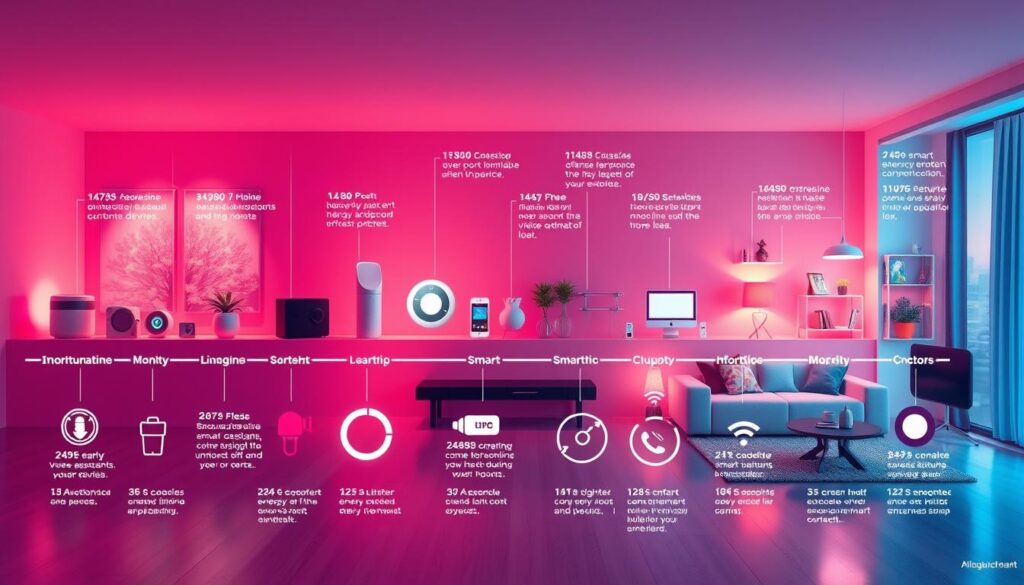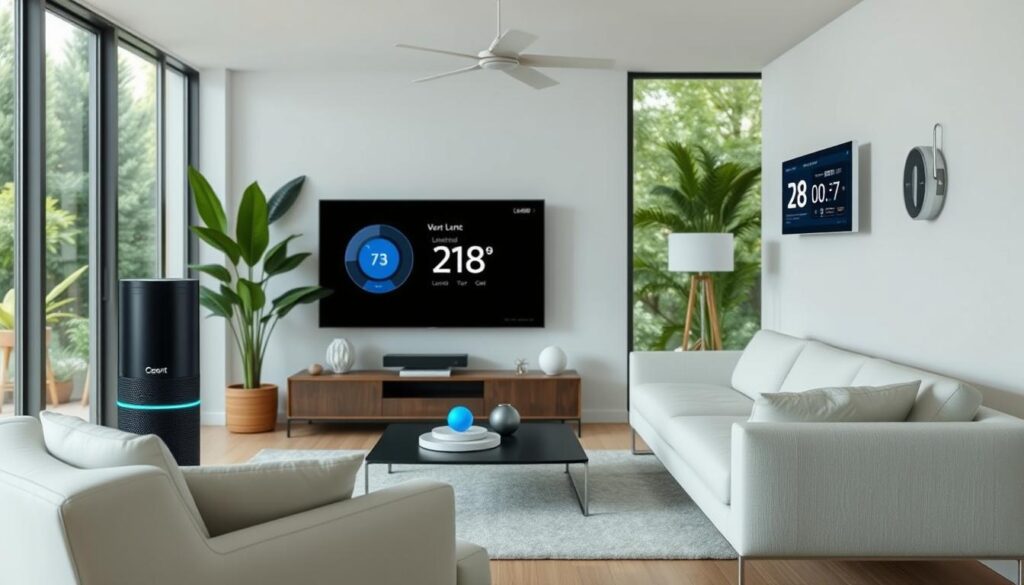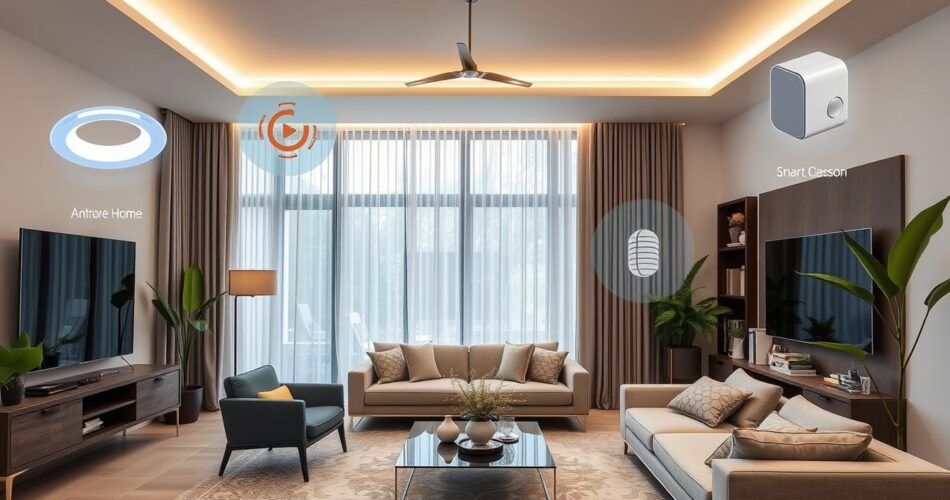Imagine walking into a home that knows exactly what you need. The smart home business is changing how we live and work. With the U.S. home automation market expected to hit $55 billion by 2028, there are more opportunities than ever.
Smart home tech has moved from a dream to a reality. Now, over 43% of U.S. homes have at least one smart device. This shows a big change in how people live. Your business can join this trend by offering solutions that make life better, safer, and more efficient.
People want homes that are tailored to their needs, with technology at the heart. The smart home business is about more than just selling gadgets. It’s about creating systems that improve our daily lives. From keeping us safe to saving energy, the growth potential is huge. Entrepreneurs who get this can build successful businesses that meet today’s homeowners’ needs.
The chance is clear: smart home tech is essential, not just a luxury. By diving into this market, you can help people change their homes and build a thriving business. Are you ready to join the home automation revolution?
Understanding the Smart Home Revolution
The smart home business is changing how we live in our homes. New technologies have made home automation better. This has opened up new chances for homeowners and business owners.

Evolution of Home Automation Technology
Home automation has grown a lot. It started with simple devices and now uses AI. We’ve moved from basic thermostats to full systems that work together.
- Early automation focused on individual device control
- Modern systems leverage AI and Internet of Things (IoT)
- Integration of voice assistants and smart sensors
Current Market Trends and Growth Potential
The home automation market is growing fast. Experts say it will keep growing. New tech is making people want to use these systems more.
| Market Metric | Projection | Year |
|---|---|---|
| Global Smart Home Market | $207.8 billion | 2027 |
| Smart Speaker Units | 320 million | 2024 |
| Household Smart Device Ownership | 41% | 2022 |
Key Components of Smart Home Systems
A good smart home system has many parts. It makes life easier, safer, and saves energy. Key parts are:
- Central smart home hub
- Connected devices and sensors
- AI-powered management software
- Mobile and voice control interfaces
As the smart home business grows, we’ll see even better systems. These systems will make our daily lives better.
Smart Home Business Opportunities in 2024

The smart home business in 2024 is full of chances for new entrepreneurs. With the market expected to hit USD 231.6 billion by 2028, it’s a great time to start a home automation business.
There are many business models for smart home entrepreneurs:
- Security Solutions: Ajax Systems has seen a 112% search growth and got USD 11M in Series A funding
- IoT Device Sales: SwitchBot shows huge potential with a 1,220% search growth
- Home Automation Installation: Services that use the latest technologies
- Maintenance and Support: Offers ongoing smart home management for recurring income
Your smart home business could earn a lot. You could make USD 100,000 to over USD 1,000,000 a year. Starting costs are between USD 10,000 and USD 200,000. Most businesses can start in 3 to 12 months.
Promising areas include:
- Smart security systems
- Energy management automation
- Home entertainment integration
- IoT device retail
- Smart appliance installation
To succeed in the smart home business, keep up with new tech. Companies like Dreame have grown fast. They’ve seen a 300% increase in robot vacuum sales, reaching over 2.4 million units sold in 120 countries.
Essential Services and Products to Offer
Starting a smart home installation business means knowing the key services and products. Your business will succeed by providing full solutions that change how people live. This makes homes more comfortable, secure, and energy-efficient.
The smart home market is full of chances for entrepreneurs. They can bring in new technologies that make homes better in many ways.
Smart Security Solutions
Homeowners always want to feel safe. Your business can offer top-notch security systems. These systems give peace of mind and keep homes protected.
- Smart locks with remote access
- Wi-Fi security cameras with real-time alerts
- Motion-detecting indoor and outdoor cameras
- Smart doorbell systems
- Integrated alarm and monitoring services
Energy Management Systems
Today’s homeowners care about saving energy. Smart home tech can cut down on bills and help the planet.
| Product | Key Benefits | Average Cost Range |
|---|---|---|
| Smart Thermostats | Automated temperature control | $100-$250 |
| Whole-Home Energy Monitors | Detailed energy consumption tracking | $200-$500 |
| Smart Power Strips | Reduce standby power consumption | $30-$80 |
Home Entertainment Integration
Make living spaces better with great entertainment. This impresses clients and grows your business.
- Whole-home audio systems
- Voice-controlled smart speakers
- Smart TVs with integrated streaming
- Automated lighting and sound scenes
By offering these services, your smart home business can meet many needs. This builds a strong reputation for innovation and quality.
Starting Your Home Automation Business
Starting a smart home business needs careful planning and knowing the market. The U.S. home automation market is expected to hit $55 billion by 2028. This is a great chance for entrepreneurs to dive into this fast-growing field.
To start a home automation business well, focus on a few key areas:
- Do deep market research
- Make a solid business plan
- Get the right licenses and insurance
- Pick the latest smart home products
- Build a team of skilled tech experts
Your business model should meet the main market needs. About 41% of U.S. homes are expected to have smart devices by 2023. This shows a big chance for your smart home business to grow.
| Business Startup Considerations | Key Factors |
|---|---|
| Initial Investment | $10,000 – $50,000 |
| Market Growth Rate | 25% CAGR |
| Primary Customer Motivation | Security and Energy Efficiency |
| Potential Annual Revenue | $100,000 – $500,000 |
When starting a home automation business, it’s crucial to understand what customers want. With 70% of people seeing smart home tech as improving their life, your business can enter a market ready for new ideas.
Building a Profitable Business Model
Starting a smart home business needs careful planning and creative ideas. The home automation market is growing fast, full of chances for new businesses.
Your business can make money in different ways by knowing the market and what customers want. The smart home IoT market is set to grow from USD 154.40 billion in 2024 to USD 604.79 billion by 2031. This is a great chance for new entrepreneurs.
Pricing Strategies for Home Automation Services
- Develop tiered service packages
- Offer customizable installation options
- Create recurring maintenance contracts
- Implement flexible pricing models
Diversifying Revenue Streams
Home automation businesses can make money in many ways:
| Revenue Stream | Potential Income |
|---|---|
| Equipment Sales | High margin product offerings |
| Installation Services | Hourly or project-based fees |
| Maintenance Contracts | Recurring monthly revenue |
| Consulting Services | Expert advice and system design |
Strategic Market Positioning
To be unique in the smart home market, focus on special areas:
- High-end custom installations
- Energy efficiency solutions
- Aging-in-place technologies
- Tech-focused residential markets
The smart home market is expected to grow, with 33.2% of households using smart home technology by 2028. This shows a lot of potential for new businesses. By building a strong business model and keeping up with trends, you can make a successful home automation business that meets what customers want.
Technical Requirements and Certifications
To start a smart home installation business, you need more than just technical skills. You must have specific certifications and know-how to shine in a crowded market.
Certifications are key to building trust in your home automation business. The Consumer Technology Association (CTA) and groups like CEDIA offer special certifications. These prove your skills and professionalism.
Key Certifications for Smart Home Professionals
- Cables & Infrastructure Technician (CIT)
- Integrated Systems Technician (IST)
- Residential Networking Specialist (RNS)
- Designer Specialist (ESC-D)
Each certification shows your dedication to high standards and opens doors for career growth. They are good for three years and need regular updates to stay current.
Essential Technical Knowledge
| Technical Skill | Importance |
|---|---|
| Low Voltage Cabling | Critical for device performance (18/2, 18/6, 22/4, 24/2 gauges) |
| Network Cables | Cat5 and Cat6 understanding for optimal connectivity |
| Power Supply Knowledge | Standardized 12V DC power requirements |
Investing in thorough training and keeping your skills sharp is crucial. Certification boosts your credibility and can lead to higher earnings in the fast-changing home automation field.
Essential Installation Toolkit
- Screwdrivers
- Professional drill set
- Wire strippers
- Multimeter
- Cable testers
By always learning and getting certified, you’ll make your smart home installation business a go-to in the competitive home automation world.
Marketing Strategies for Smart Home Businesses
In the fast-growing world of home automation, good marketing is key to success. The smart home market is expected to grow from USD 78.3 billion in 2020 to USD 135.3 billion by 2025. This offers big chances for new businesses.
To start a successful smart home business, you need a solid marketing plan. This plan should use digital tools and focus on connecting with customers.
Digital Marketing Techniques
Your digital marketing strategy is vital for drawing in new customers. Here are some effective methods:
- Search Engine Optimization (SEO) to boost your online presence
- Pay-per-click ads that target specific groups
- Content marketing to show off your smart home tech knowledge
- Video demos of your home automation solutions
Customer Acquisition Methods
To grow your smart home business, use smart customer acquisition strategies:
- Start referral programs with great rewards
- Work with real estate agents and home builders
- Join local home and garden shows
- Offer free consultations and live tech demos
Brand Building Strategies
Building trust is essential in the home automation field. Focus on:
- Sharing customer testimonials
- Creating educational content on smart home tech
- Keeping a professional and consistent online image
- Emphasizing what makes your business unique
Pro tip: About 70% of consumers are more likely to buy smart home devices after seeing them in action. So, make sure to use visual storytelling in your marketing.
Smart Home Integration and Installation Best Practices
Running a successful smart home installation business needs precision and technical skills. Your home automation business should aim to make technology seamless. This transforms homes into smart living spaces.
When you start with smart home integration, keep these best practices in mind:
- Comprehensive Home Assessment
- Check the home’s electrical setup
- Look at Wi-Fi coverage and strength
- See if it works with old systems
- Develop Detailed Project Blueprints
- Make clear installation plans
- Plan where devices will go
- Think about possible technical issues
Network security is key in smart home installation. Strong protection builds trust and keeps systems reliable. Tell clients to use strong passwords and keep networks separate for devices.
Your business should always be learning. CEDIA certifications are great for improving skills and knowing new tech.
- Key Certification Benefits:
- More credibility in the industry
- Latest tech insights
- Stand out in the market
Good home automation businesses see each job as a chance to show off their skills. They build strong client relationships and long-term tech partnerships.
Creating Customer-Centric Service Packages
Starting a smart home business means making service packages that focus on customers. You need to know what different customers want. Then, you can offer flexible solutions that fit their needs and budgets.
Creating strategic service packages can really help your business grow. You can offer options that grow with your customers. This way, they can start small and add more to their smart home systems later.
- Basic Package: Entry-level smart home setup for budget-conscious customers
- Advanced Package: Comprehensive home automation with multiple integrated systems
- Premium Package: Fully customized smart home solution with ongoing support
Customers want experiences that feel personal and valuable. Your smart home business can stand out by offering:
- Flexible installation options
- Customizable technology bundles
- Transparent pricing structures
- Ongoing maintenance and support services
Did you know 43% of internet households now use smart security like cameras and doorbells? This shows there’s a big demand for smart home services that offer safety, convenience, and peace of mind.
When making service packages, aim for recurring revenue. This means providing ongoing value to your customers. Services like predictive maintenance, remote monitoring, and personalized support can help keep customers coming back and loyal to your business.
Addressing Security and Privacy Concerns
In the fast-changing world of smart homes, security and privacy are top concerns. As companies innovate, it’s key to understand and tackle risks. This helps build trust and ensures success in the long run.
Data Protection Strategies
Keeping customer data safe is a big job. Smart home companies need to take strong steps to protect it:
- Use end-to-end encryption for all device talks
- Follow secure ways to store data
- Keep updating firmware and security rules
Network Security Standards
Strong network security is vital for smart homes. Important things to think about include:
| Security Measure | Implementation Strategy |
|---|---|
| Firewall Protection | Set up advanced network firewalls |
| VPN Usage | Give secure ways to access remotely |
| Two-Factor Authentication | Lower unauthorized access by 70% |
Customer Privacy Protocols
Being open about privacy is crucial. Your smart home business should:
- Make clear, easy-to-understand privacy policies
- Let customers choose not to share data
- Send regular security updates
With 62% of consumers willing to pay more for strong privacy, focusing on security can set you apart. By taking a thorough approach to security, you can gain customer trust and stand out in the market.
Future Growth and Expansion Opportunities
The smart home business is on the verge of a big change. It’s expected to grow from USD 85,664.9 million in 2023 to USD 480,658.2 million by 2032. This means entrepreneurs have a chance to innovate and grab a big share of the market.
Key growth areas for your smart home business include:
- Advanced AI Integration: Using machine learning to make home systems smarter and more adaptable
- 5G Connectivity: Improving network capabilities for better device communication
- Health and Wellness Technologies: Creating smart home solutions that help improve health and well-being
- Energy Efficiency Systems: Developing sustainable solutions to cut down energy use
Regional markets offer different chances for growth. North America is a leader in tech adoption, while Asia-Pacific is growing fast. Latin America and the Middle East are also promising for your home automation business.
Strategic considerations for future growth include:
- Investing in the latest IoT technologies
- Creating device ecosystems that work together
- Improving cybersecurity and privacy
- Partnering with tech giants
The smart home business is set for impressive growth, with a 20.7% Compound Annual Growth Rate. Your ability to innovate, adapt, and predict market trends will be key to success in this fast-changing industry.
Conclusion
Starting a smart home business is a great chance in the growing home automation market. The market is expected to hit $158 billion by 2024. Also, 50% of U.S. homes will be smart by 2025. This makes now the perfect time to start.
Your path to starting a home automation business needs careful planning and tech skills. Focus on services like security, energy management, and entertainment. This will make your business stand out. Plus, 77% of millennials are ready to pay more for smart home features.
The best smart home businesses keep learning and adapt quickly. They also focus on security. With growing concerns about data privacy, offering reliable solutions is key. Get professional certifications, stay up-to-date with tech, and always aim for great customer service.
Starting your smart home business is an exciting venture. Stay focused on what customers want and keep up with new tech. The smart home market is full of chances for innovative businesses to change how we live.
